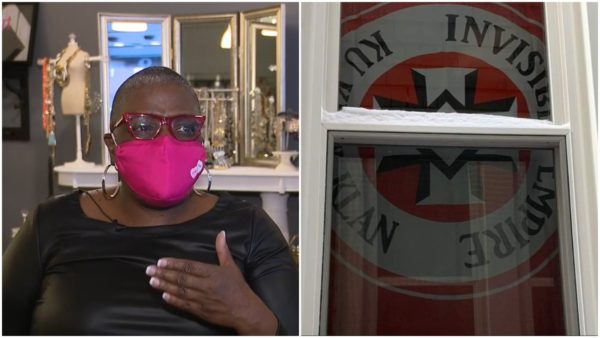A white man hung a Ku Klux Klan flag in a window of his Michigan home that faced his Black neighbor’s house.
And when he claimed he did it because he couldn’t afford curtains, police purchased drapes for him.
“Any Black person in America seeing a Klan flag staring back at them when they look out at their neighbor’s window, it’s obviously horrifying,” Je Donna Dinges told Atlanta Black Star during a phone interview. “This man threatened me and my family, and you Dylann Roof’d the situation. You bought him some curtains. And they were like, ‘Well, we were trying to defuse the situation.’ You don’t defuse the situation by using my tax dollars, taxpayer money and taxpayers’ resources to buy him a gift after he put a Klan flag up and threatened me.”

The saga began Feb. 16 in Grosse Pointe Park, a suburb just outside of Detroit that Dinges and her family moved to about 11 years ago. Her ex-husband noticed the racist flag as he was taking out the trash. It bore an image of the KKK’s signature blood drop cross surrounded with the words “Invisible Empire” and “Ku Klux Klan.”
Dinges said she took the banner as a threat. She could see the flag from her dining room window and felt like her 31-year-old neighbor displayed it to terrorize her and her adult daughter, who lives with her.
She called the FBI, and federal authorities took a report but told Dinges they didn’t have enough probable cause to investigate the incident because the neighbor never harmed or tried to intimidate her. She also contacted the Michigan Attorney General’s Office in Detroit, and they also told her there wasn’t much they could do because the neighbor had a First Amendment right to hang the KKK flag in his home.
“I think it’s kind of a shame in this country, that the laws are set up that someone has to harm you, for something can be done,” Dinges said.
So Dinges enlisted the help of the media. She reached out to Mara McDonald, a reporter for Detroit TV station WDIV 4. McDonald called Grosse Pointe Park’s mayor, city officials and police chief to inquire about the situation. The following day the police department sent detectives to her neighbor’s house.
The story went viral after Greg Bowen wrote a column in Deadline Detroit.
The officers spoke to his girlfriend and asked them to take the flag down. She told the detectives her boyfriend hung the flag after Dinges installed a security camera in a windowsill on a pathway that divides their homes. His supposed intent was to keep the camera’s gaze out of his home because his children did their homework by a window on that side of the home. His girlfriend told detectives he didn’t have enough money to afford curtains, so he hung the KKK banner instead. When asked why neither of them went to Dinges’ house and asked their neighbor to point the camera in a different direction, the girlfriend told officers they were “nonconfrontational people,” Dinges said police told her.
“I don’t know how you can be any more confrontational than a Klan flag,” she said. “The only thing that I can think of more confrontational than that is somebody sticking a gun to your face.”
Dinges said her camera did not even point in the direction where her neighbor’s kids supposedly did their homework.
She described the 31-year-old white man as a “troublemaker” and an “odd guy.” She said her ex-husband found a gas can filled with gasoline in her trash can on Jan. 20. That discovery was what prompted her to get the security cameras installed in the first place.
She suspects her neighbor put the can in her trash bin, although she admitted she has no evidence that he did.
When police responded to that incident, Dinges said she didn’t feel they did enough to find out who the actual culprit was. That’s why she didn’t call them to handle the Klan flag.
The name of Dinges’ neighbor has not been publicly released. She said she and many of her neighbors called police about five years ago when the man fired gunshots into the air in the middle of the night. She claims police came to knock on his door the following day, but he didn’t answer. When the officers left, the man came outside with a gun holstered on his belt and stalked the sidewalk outside his house, she claimed.
According to Dinges, many city leaders and police officials who called her after the flag incident characterized him as dangerous and unhinged.
“We know we created this monster,” she said. “This person has lived on this street. Several people in the police department told me he was a bad guy, the mayor told me this is a bad guy. Everybody knows he’s a bad guy, but nobody did anything about it all these times he’s done bad things.”
The community staged a protest on the street Feb. 21, condemning the display of racism, and about 800 showed up, according a post on Dinges’ Facebook page.
But not all the response has been supportive. Dinges owns a successful clothing botique that was featured on CNBC just days before the ordeal began with her neighbor’s flag. People have gone to her business page and left one-star Yelp reviews since news of the situation spread. One person left a disparaging review under the profile name “Nate Higgers,” a meme commonly used as a makeshift slur on social media.
On March 2, Wayne County Prosecutor’s Office announced that no hate crime charges would be filed, saying there was insufficient evidence to charge the neighbor with a hate crime. Michigan’s statute for ethnic intimidation stipulates there must be physical contact, damage or destruction, defacement of property, or a threat.
“There is absolutely no question that what happened to Ms. Dinges was despicable, traumatizing, and completely unacceptable,” prosecuting attorney Kym Worthy said in a statement. “But, very unfortunately in my view, not a crime. The KKK flag, while intending to be visible to Ms. Dinges, was hanging inside of her neighbor’s house.”
Worthy called on the Michigan Legislature to review the current law to “protect citizens from this kind of horrible conduct.”
Dinges said she understood the prosecutor’s dilemma and knows charges can’t be filed just because of the emotions of the situation.
“We can’t prosecute people based on that; you have to follow the letter of the law,” Dinges said. “And the law that we have, basically it’s a snaggletooth law. It doesn’t have any teeth. Because if it did, she would have been able to prosecute him.”
She agreed that the state statute needs to become more effective. Dinges pointed to Tatayana Vanderlaan, an 18-year-old Black girl who suffered through years of racial abuse at her Michigan high school. Vanderlaan was called the N-word, teased about her hair and bullied to the point that she feared going back to school, according to a Facebook post that has gone viral.
Dinges said she plans to push for a change in the state’s racial discrimination laws to protect people like her and Vanderlaan.
“These are people who are emboldened people. They think nothing’s going to happen to them, so they just keep doing this stuff,” she said. “There’s been so many things that have happened in this community that have made it clear that Black people are not welcome here. So the culture has to change. We have to address why this is a fertile feeding ground for hatred.”


